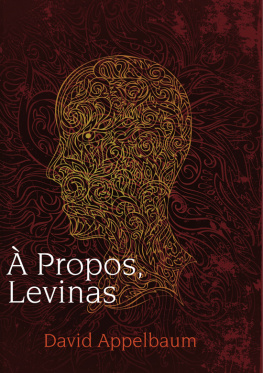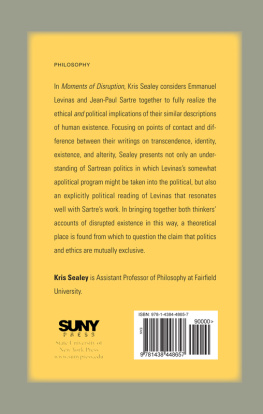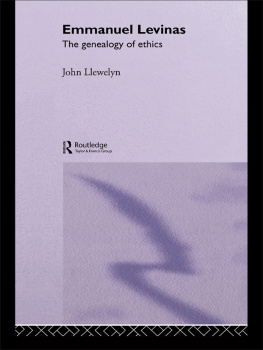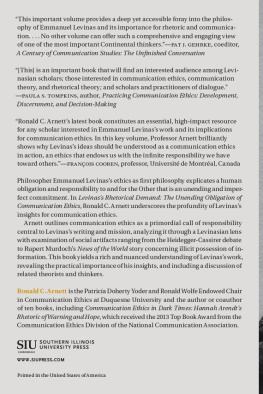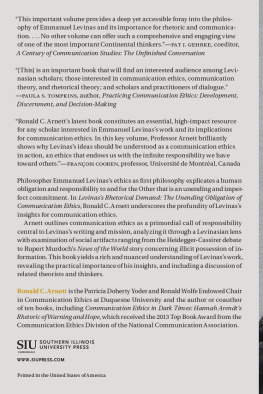
Frontispiece cartoon by the kind permission of The New Yorker.
Propos, Levinas
David Appelbaum

Published by State University of New York Press, Albany
2012 State University of New York
All rights reserved
Printed in the United States of America
No part of this book may be used or reproduced in any manner whatsoever without written permission. No part of this book may be stored in a retrieval system or transmitted in any form or by any means including electronic, electrostatic, magnetic tape, mechanical, photocopying, recording, or otherwise without the prior permission in writing of the publisher.
For information, contact State University of New York Press, Albany, NY
www.sunypress.edu
Production by Eileen Meehan
Marketing by Anne M. Valentine
Library of Congress Cataloging-in-Publication Data
Appelbaum, David.
Propos, Levinas / David Appelbaum.
p. cm.
Includes bibliographical references and index.
ISBN 978-1-4384-4311-9 (hardcover : alk. paper)
1. Levinas, Emmanuel. I. Title.
B2430.L484A66 2012
194dc23
2011036266
10 9 8 7 6 5 4 3 2 1
Abbreviations
Maurice Blanchot
| GO | The Gaze of Orpheus and Other Literary Essays. Tr. Lydia Davis. Barrytown, NY: Station Hill Press, 1981. |
| IC | The Infinite Conversation. Tr. Susan Hanson. Minneapolis: University of Minnesota Press, 1992. |
| OCC | Our Clandestine Companion. In Face to Face with Levinas, ed. Richard A. Cohen, 4152. Albany: State University of New York Press, 1986. |
| SL | The Space of Literature. Tr. Ann Smock. Lincoln: University of Nebraska Press, 1982. |
| SHBR | The Station Hill Blanchot Reader. Tr. Lydia Davis, Paul Auster, and Rober Lamberton. Barrytown, NY: Station Hill Press, 1999. |
| SNB | The Step Not Beyond. Tr. Lycette Nelson. Albany: State University of New York Press, 1992. |
| UC | The Unavowable Community. Tr. Pierre Joris. Barrytown, NY: Station Hill Press, 1988. |
| WD | The Writing of the Disaster. Tr. Ann Smock. Lincoln: University of Nebraska Press, 1985. |
| WF | The Work of Fire. Tr. Charlotte Mandell. Stanford: Stanford University Press, 1995. |
Jacques Derrida
| A | Aporias. Tr. Thomas Dutoit. Stanford: Stanford University Press, 1993. |
| AT | At This Very Moment in This Work Here I Am. Tr. Ruben Berezdivin. In Re-Reading Levinas, ed. Robert Bernasconi and Simon Critchley, 1148. Bloomington: University of Indiana Press, 1991. |
| D | Dissemination. Tr. Barbara Johnson. Chicago: University of Chicago Press, 1981. |
| GoD | The Gift of Death. Tr. David Wills. Chicago: University of Chicago Press, 1995. |
| MP | Margins of Philosophy. Tr. Alan Bass. Chicago: University of Chicago Press, 1982. |
| WD | Writing and Difference. Tr. Alan Bass. Chicago: University of Chicago Press, 1978. |
Martin Heidegger
| BT | Being and Time. Tr. Joan Stambaugh. Albany: State University of New York Press, 1996. |
| EB | Existence and Being. Tr. Douglas Scott. Chicago: Henry Regnery 1946. |
| EGT | Early Greek Thinking. Tr. David Farrell Krell anad Frank A. Capuzzi. New York: Harper and Row, 1975. |
| ID | Identity and Difference. Tr. Joan Stambaugh. New York: Harper and Row, 1969. |
| OWL | On the Way to Language. Tr. Peter Hertz. New York: Harper and Row, 1971. |
| PLT | Poetry, Language, Thought. Tr. Albert Hofstadter. New York: Harper and Row, 1971. |
Emmanuel Levinas
| BPW | Basic Philosophical Writings. Ed. Adriaan T. Peperzak, Simon Critchley, and Robert Bernasconi. Bloomington: University of Indiana Press, 1996. |
| CPP | Collected Philosophical Papers. Tr. Alphonso Lingis. Pittsburgh: Duquesne University Press, 1998. |
| EN | Entre Nous: Thinking of the Other. Tr. Michael B. Smith and Barbara Harshaw. New York: Columbia University Press, 1998. |
| EE | Existence and Existents. Tr. Alphonso Lingis. Pittsburgh: Duquesne University Press, 2001. |
| ITN | In the Time of the Nations. Tr. Michael B. Smith. Bloomington: University of Indiana Press, 1994. |
| OB | Otherwise Than Being or Beyond Essence. Tr. Alphonso Lingis. Pittsburgh: Duquesne University Press, 1998. |
| OG | Of God Who Comes to Mind. Tr. Bettina Bergo. Stanford: Stanford University Press, 1998. |
| OS | Outside the Subject. Tr. Michael B. Smith. Stanford: Stanford University Press, 1993. |
| PN | Proper Names. Tr. Michael B. Smith. Stanford: Stanford University Press, 1996. |
| TI | Totality and Infinity. Tr. Alphonso Lingis. Pittsburgh: Duquesne University Press, 1969. |
| TO | Time and the Other. Tr. Richard A. Cohen. Pittsburgh: Duquesne University Press, 1987. |
| TOT | The Trace of the Other. Tr. Alphonso Lingis. In Deconstruction in Context, ed. Mark Taylor, 34559. Chicago: University of Chicago Press, 1986. |
| WO | Wholly Other. Tr. Simon Critchley. In Re-Reading Levinas, ed. Robert Bernasconi and Simon Critchley, 310. Bloomington: University of Indiana Press, 1991. |
Part I
Stagework
Pre-text
The pre-text is made necessary in order to state what the text is not. It supplements the text by another text, which in augmenting the original, comes to replace it. These two statements make it necessary from the start to supply an abstract to the text. That abstract, drawn out from it, will form a separate text, different from the first two, to illuminate and impersonate both.
The deep interest of the present study lies with the image. Its power is to rent the field of meaning, leaving it other than thought. Language that serves the image through articulation is incapable of dealing with the remainder. Thus, image comes to haunt language, which is to say, dialectics, philosophy, and the contest for truth. The diabolic visitation of the guest that the house would have expelledderision, mockery, disrespect, and false pretensecan simulate truth. The study takes the premise that the incorporation of the image, through suppression, will remain the hidden source of trauma, a blow delivered to the production of meaning. Image announces its own coming in a shattering of form, at times simulating its own appearance. Although phenomenality is the stage, an a priori, quasi-transcendental backdrop is part of the play. The propos concern the fact that the image is not found in experience but escapes it. This exposes the power of the false whose simulations would suspend a truth that image represents, as conceived nearly three millennia ago.
The appropriation of the grammatical flaw produced by the imageits susceptibility to a traumatism that is an invention of the otherin Levinas's ethics must be challenged in light of the image and its operation. In trying to outflank such an inquiry by taking the imaginary out of play, he neutralizes the image's prerogative and consigns the performative event within the grammar of experience, the

